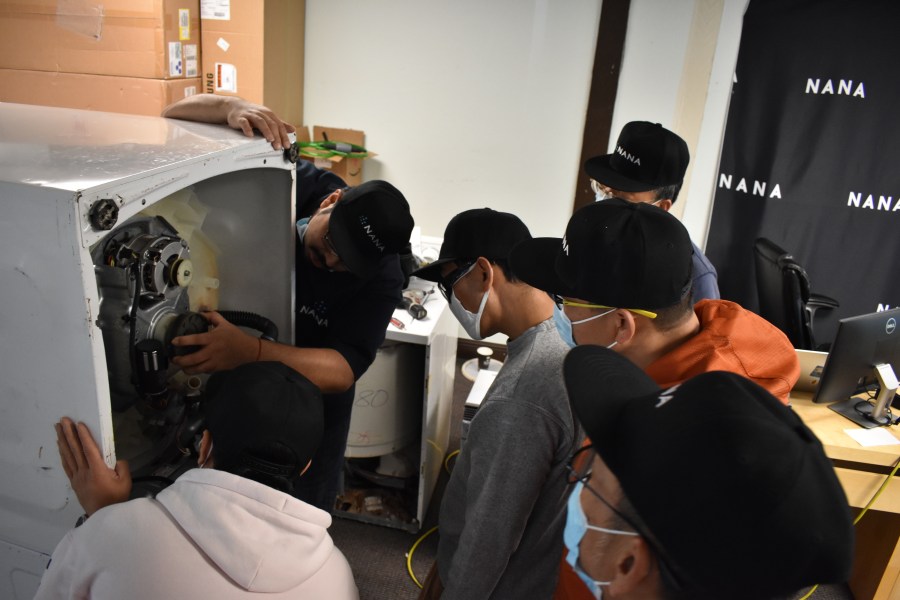Tuition-free trade school model tries to rally gig economy
Testing on staging11
(NewsNation) — A new kind of trade school is trying to make good-paying, stable gig work more accessible to workers looking for something that doesn’t require an expensive college degree.
Fifty-two percent of the workforce is expected to be made up of independent contractors within the next five years. Pandemic-driven layoffs led more people to gig jobs, where on average they make 58% less than full-time workers.
Entrepreneur David Zamir is trying to offer better paying jobs for gig workers. He found his place in appliance repair, after a friend introduced him.
“I’m like, wait, what? He makes more than $15,000 a month fixing appliances,” Zamir said. “And here I am with 10 employees, and I make less than $2,500 a month.”
The inevitability that appliances break is what led Zamir to found The Nana Academy.
The program combines free online classes and in-person job shadowing. It connects technicians with jobs from Samsung, GE and other brand-name appliance companies.
Zamir calls it a new approach to gig work, which prioritizes education, mentorship and support for its independent contractors.
“That’s the future of work: curiosity, fast-learning specific skills, knowing that you can always get retrained,” Zamir said.
He emphasizes it only takes about a month for technicians to learn marketable skills in a growing field with a perpetual need. And because Nana does all of the contracting and customer service — which can cost a private technician up to $4,000 a month — the barrier to entry stays low.
Plus, traditional trade schools can cost as much as $17,000 a year. Contrast that with Nana, which is free and provides ongoing training and long-term mentorship.
‘fulfilling work’
In his car driving between jobs, Geauston Smith outlined his day: an easy refrigerator fix in the morning, followed by a washer, dishwasher and an icemaker in the afternoon.
“It’s like a basic anatomy lesson,” Smith said. “What are the parts? How do the motors work? … When you’re trying to diagnose the situation, each component is a little bit different.”

Smith is one of thousands working to repair appliances like fridges and ovens after being trained through Nana Academy’s free courses.
He tried driving for DoorDash after his catering company shuttered in the early pandemic, but Nana helped him stabilize his income — essential for the single dad living in the East Bay area near San Francisco where rents are almost $1,000 higher per month than the national average.
“I have my time scheduled out to where I can split my time,” Smith said. “I can knock out four more jobs before the day’s done and still have time later with (my son).”
Since 2017, Nana has enrolled more than 8,000 students in five states and 24 cities, the majority men aged 35-44, according to the startup. And the platform is growing rapidly, they say, growing by 65% from 2020 to 2021, with a waitlist for in-person training.
“The reason why so many people are excited about Nana is the win-win situation,” Zamir said. “The government interests of having low unemployment, the community interests of having high societal health given the fact that people are employed in a fulfilling work.”
A CROWDED FIELD
A growing number of gig-based startups offer free training to workers in fields like IT, sales and customer service.
Take startup SV Academy, which trains workers to sell software. Or a night school called Samaschool, that trains workers to start their own businesses leveraging companies like TaskRabbit or Care.com.
These startups promise the same flexibility as being a driver for Uber, a dog walker for Rover or a shopper for InstaCart. But unlike those companies — where workers complain of low pay, unhealthy conditions and constantly being at the whim of demand — owners say these new ones give more than they take.
Nana says the average technician working full time makes about $5,000 a month, or about $60,000 a year. (That’s repairing three appliances a day, five days a week.)
Still, Nana’s workers are classified as independent contractors. That means they don’t get paid for sick leave, retirement savings, health care, wear on their cars, protections if hurt on the job — which Dr. Erin Hatton, an expert on gig work and the economy, calls invisible costs that build up over time.
“The growing number of people who are relying on this as a full-time income … is particularly vulnerable,” Hatton said. “They’re vulnerable when gas prices suddenly surge. They’re vulnerable when there are suddenly a lot of drivers on the market and so they’re getting fewer jobs. They’re vulnerable when they realize that they need protection when they’re in a car accident, for example. And suddenly, they learn that they don’t have …. all of these things that a traditional employee would have.”
Workers are also required to provide their own tools, which could be an expensive investment. Zamir said he would like to add some of these benefits in the coming years.
Still, after experiencing the turbulence of the pandemic economy, Smith said Nana has given him job security.
“We have some recession-proof skills,” he said. “Everyone is going to have something break.”
Correction: A previous version misspelled Geauston Smith’s name. Nana Academy works with GE, not LG.
